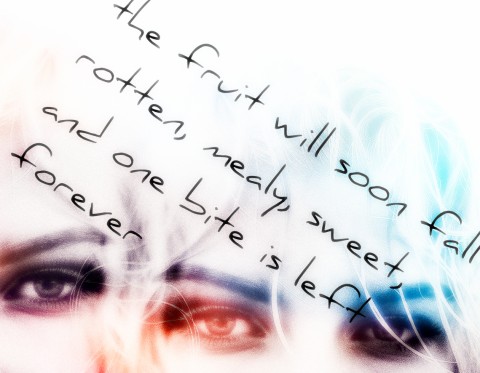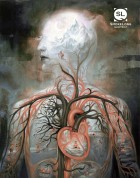We used to sit in the auditorium and watch play practice because Mr. Fink couldn’t think of a way to actively cast the girl with two heads. He was too careful to tell us, though, so we were cast again and again as second understudies. He behaved like we were a queen–he didn’t make eye contact, but we always had two bottles of water, cool from the mini fridge by his desk.
We were there mostly to watch Jack work, anyways. Occasionally he would come out of the scene shop with sawdust stippling his face and shoulders, a bulge of rolling tobacco in his back pocket, as secret as we were.
Jack liked to drive fast around curves, the low center of his little car lurching forward while the rest of us, the meat of us, was pushed back into the seat. We were not so strange looking. Our two heads had blonde hair that moved in the wind, although we would never be able to drive. The state didn’t know how to license a sixteen-year-old girl with two moving, breathing heads.
In his bedroom, Jack liked to stroke us while he watched our faces. He was older and more mature, so we assumed he saw something beyond what was in front of him. We looked up at him watching each of our mouths open, two sets of teeth peeking under our pink lips, our enthusiasm not entirely a show but the only acting we ever got to participate in, and we knew then that we were destined to be special. Our complexity had nothing to do with the duplicate nature of our faces–which were almost, if you didn’t look too long, an exact copy.
After the sex was done, Jack played video games. We read through his self-published chapbook of poems while he shot guns at tiny figures on the screen. He wrote beautifully. Each line like a trail of rain on a window, a dark hallway that we walked down with just our fingertips. We were so swept with the intensity of it all that we almost didn’t care that every poem was about some other girl. We put our self in the grey outlines of the others–fitting into that silhouette gruesomely, carnivorously, the only way we knew how.
We didn’t hide these thoughts from our self. Everything, at that age, felt like the last page of a chapter.
*
Jack’s room was at the top of the stairs in a house filled with brothers. They migrated around the house constantly, stumbling over the orange plastic of fake guns, juggling on the porch, making trails of dominos carefully and then kicking through them. Although they ruined all their hard work, we were impressed. We never had the patience for small things.
We were pouring two bowls of cereal when one of the brothers galloped into the kitchen. His hair was cut in a little brown bowl around his face. He stopped mid-step, his foot arching in the air.
“Hey,” he said. It was the first time one had spoken to us.
“Hi,” we said.
“Does it hurt?” He was eyeing the hot white fork where our necks met.
“No,” we said, “no, of course not.” We smiled. When he didn’t run off, we tried to focus on the task in front of us: a crumple of cereal, a leak of milk. Two things together in a bowl.
*
Jack was writing a new poem. We tried to stay as still as possible when he wrote, and we let our mind wander. We wandered together, usually, sharing everything we had the way we shared anything else. Clothing, oxygen, our name. We imagined walking in a French market with him. We imagined cooking next to him, for him, something hot and peppery. Our life would be colored not by the fact of our body, but by the way he smelled like orange peels and the smooth, flat pane of his fingernails. Somehow, we would morph into something solitary surrounded by the purity of his attention.
He read aloud: the fruit will soon fall / rotten, mealy, sweet, / and one bite is left / forever.
“Haunting,” we said. We liked the way that sounded–everything was haunted, fraught, perilous. On the edge of something. “What does it mean?” we asked. He sighed and got up, grabbing a pack of skeletal rolling papers off his desk, shrugging his shoulders to get us to follow him.
*
Outside, he rolled us a cigarette without asking if we wanted one. The brothers were hitting tennis balls back and forth in the tall grass of the backyard. They were focused, although one looked over to watch us blow smoke out of both of our mouths at once. Who could blame him for that, though. The sun was starting to set, and bugs gathered around the porch light. He went back to hitting the ball to his brothers, the swing and whack of the racquet like two slow feet.
Jack began explaining that nothing means anything– that life was just one looped stain, connected to itself at every point. We closed our eyes and imagined spinning out in his car on a wet road. The black circles the tires would make on the asphalt, the force pulling our two heads further apart until the world snapped into two identical versions of itself.

Notes from Guest Reader Meghan Phillips
I’m always drawn to stories about the strangeness of being a teenage girl, and I love how the writer embodies that strangeness in her two-headed narrator. Plus, this piece is just bursting with beautiful lines. Sentences that made me say ‘oh.’


 The SmokeLong Grand Micro Contest (The Mikey) is now an annual competition celebrating and compensating the best micro fiction and nonfiction online.
The SmokeLong Grand Micro Contest (The Mikey) is now an annual competition celebrating and compensating the best micro fiction and nonfiction online.